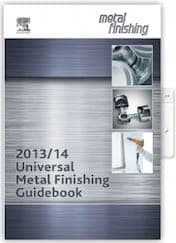
Home of the world famous 'finishing.com HOTLINE' (since 1989)
-----
Cu plating -- HCl instead of vinegar?
Q. Hello,
I recently began experimenting with copper electroplating. I have semi successfully done so with vinegar ⇦in bulk on eBay or Amazon [affil link] and very low voltage over a long period of time and occasionally wiping the object to be plated. I'm wondering if it's possible to use HCl instead of vinegar and if so, is there any change to the voltage/amperage? Also, does the distance between the anode and cathode have any effect on the finished product? I am fully aware of the dangers of using HCl since I've been etching my own PC boards for some time using a mixture of HCl and H2O2. The addition of the H2O2 speeds-up the etching process by many times but I assume that it wouldn't necessarily help in the plating process since it may increase the amount of hydrogen buildup on the cathode. Am I correct?
Thanks in advance.
Tom HaleElectrical Engineer - McAllen, Texas, U.S.A.
2004
(affil links)

free pdf is currently available from academia.edu
A. Hi Tom. vinegar is really for school demos of the principles of electroplating, it's probably an impractical electrolyte to actually do much with, but so is HCl. Regardless of other things you know, you probably shouldn't experiment with electroplating electrolytes stronger than vinegar unless you have a plating book on hand to review. The Metal Finishing Guidebook is an inexpensive and readily available one, and is even available on line for free . . . and you'll see that sulfuric acid is probably a better bet than HCl.
Closer anode to cathode spacing reduces solution resistance and therefore decreases required voltage. Electroplating is a reduction process and peroxide is a powerful oxidizing agent, that really isn't compatible with it. Good luck!

Ted Mooney, P.E.
Striving to live Aloha
finishing.com - Pine Beach, New Jersey
Ted is available for instant help
or longer-term assistance.
2004
Q. Hello Ted, thanks for your response. I just wanted to add to this thread the results of my experimentation of using HCl to plate copper onto just about any metal. First of all, the results absolutely stunned me and exceeded my expectations! As I said before, I've been using HCl to etch my printed circuit boards for some time now so essentially, all I did was to turn my etching tank into a plating tank by adding anode/cathode. I'm using my workbench power supply to supply about 2 to 3 volts with a resistor in series to keep the current down to well below 100 mA. By now, I've plated several objects in a matter of minutes but it's important to "shake" the cathode to release the air bubbles which form after a short time. I also tried this on a couple of quarters and nickels. The result was a smooth, very shiny deposition of copper onto the coins without the use of brighteners, levelers, or any other additives. I wish I had a digital camera so that I could illustrate the results. If you have any questions or comments, feel free to contact me.
Thanks again
Tom Hale [returning]Electrical Engineer - McAllen, Texas
Ed. note: Thanks for the promising feedback, Tom!
No dead threads!
Your Q, A, or Comment puts this thread on The Finishing.com HOTLINE.